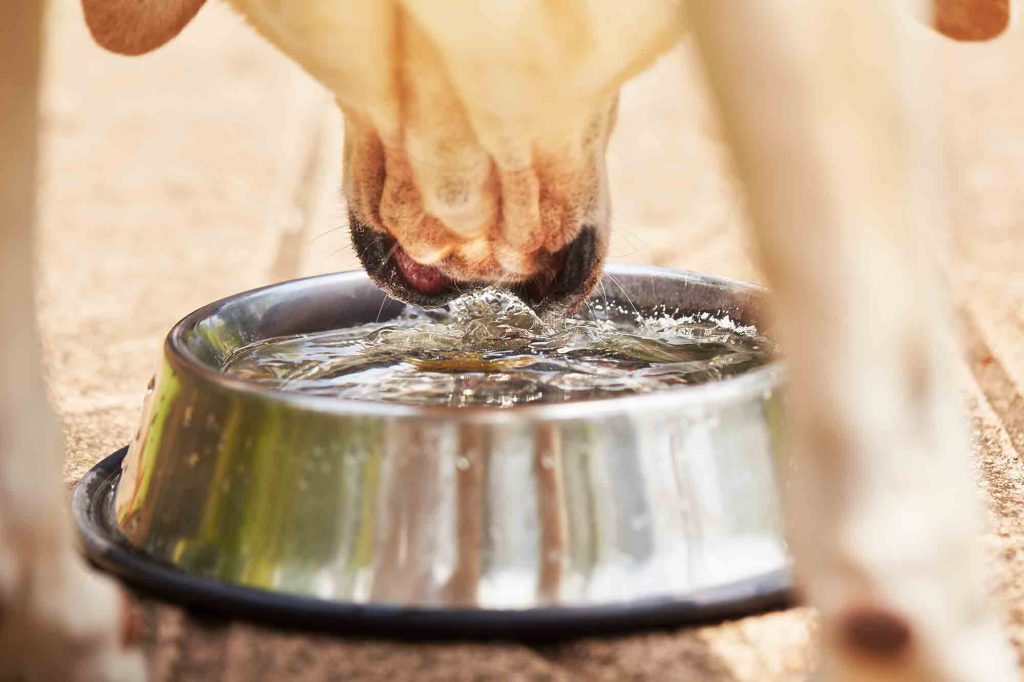The Heat Is On: Learning to Spot and Prevent Dehydration in Pets
 It’s no secret that water is vital to the existence of humans and animals, as well as most other living creatures. Water makes up about 70-80% of a pet’s total body mass and is critical for the proper functioning of each and every cell and system.
It’s no secret that water is vital to the existence of humans and animals, as well as most other living creatures. Water makes up about 70-80% of a pet’s total body mass and is critical for the proper functioning of each and every cell and system.
Even a small loss of a pet’s fluids can disrupt the body’s delicate balance and result in dehydration. If not corrected, dehydration will impair the body’s functioning and quickly become a medical emergency.
Dehydration in Pets
Dehydration in pets occurs when their body’s fluid levels dip below a normal functional range. Once the body detects that its fluid levels are running low, it begins drawing water out of its cells, which causes these cells to lose electrolytes, including, sodium, magnesium, potassium, and chloride. This electrolyte imbalance can lead to loss of muscle function, brain function, and other important bodily processes that, if not reversed, can be fatal.
Cause for Concern
When a pet loses more water than he or she is taking in, whether from vomiting, diarrhea, overexertion in warm weather, or simply not drinking enough, dehydration is the result.
Symptoms of dehydration in pets include:
- Excessive panting
- Restlessness
- Lethargy
- Dry mouth (sticky, ropey saliva)
- Reduced skin elasticity (when pulled and released, skin does not quickly go back into place)
- Reduced urine/bowel movement and frequency
- Dry gums and nose
- Sunken eyes
- Loss of appetite
- Breathing difficulties
- Water seeking behavior (drinking from standing pools or puddles, potted plants, and other abnormal locations)
- Depression
If your pet is exhibiting any of the signs of dehydration, give your pet fresh water immediately. If your pet is unable to take in water or if symptoms persist, please contact our Lone Tree Veterinary Medical Center medical team immediately. Your pet may require IV fluid therapy to restore proper fluid balance, as well as additional care and/or tests to determine if an underlying health issue contributed to the dehydration problem.
Too Hot to Trot?
Summertime brings with it plenty of opportunities for your pet to become overheated, which can quickly lead to dehydration. Keep your pet cool when temperatures rise by doing the following:
- Provide access to plenty of fresh water at all times, both indoors and outdoors
- Bring along water specifically for your pet on walks, hikes and all other outdoor activities
- Make sure your pet has a shaded area that will protect it from the the sun while outdoors
- Only exercise pets in the early morning or evening hours, when the temperature is cooler
- Keep pets inside where there is air conditioning or fans during the hottest part of the day
- NEVER leave your pet inside a parked car, even for a moment! Temperatures inside parked vehicles can rise to dangerous levels within minutes, even if the car is in a shaded area and the windows are cracked.
Feline Concerns
Dehydration is of particular concern with cats because they often don’t or won’t take in enough water to be fully hydrated. You can increase your cat’s water consumption by feeding canned food, which has higher water content than dry food. Providing a circulating water fountain for kitty to drink from is another way to stimulate an interest in drinking water.
Helping Your Pet
Helping your pet achieve and maintain optimal health and wellness is our top priority! Don’t hesitate to give us a call with any questions or concerns you may have about your pet.



